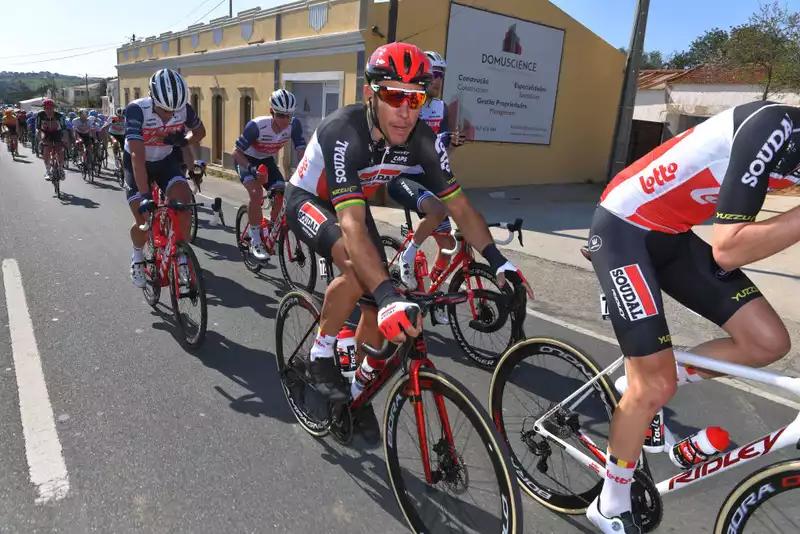It could all be over tomorrow. Strade Bianche signals the resumption of the World Tour calendar after a four-and-a-half month hiatus, but Philippe Gilbert (Lotto-Soudal) is mindful that every race on the revised UCI schedule could be his last, even as COVID-19 is all the rage, Therein lies the precarious reality of bicycle racing.
"I think we need to have the mentality that every race could be the last race as we restart this season. Unfortunately, that is the reality," Gilbert told reporters via video call on Friday, the eve of Strade Bianche.
"It will be difficult to organize. You have to run every race as if it were your last and not plan too much for the future. You have to be very resourceful."
Most European countries have been gradually emerging from the blockade over the past two months, but over the past week there have been new reports of an increase in the number of coronavirus cases and the reopening of travel and quarantine restrictions in some areas. At this week's Vuelta a Burgos, five riders from two teams were withdrawn from the race as a precautionary measure after coming into contact with COVID-19 infected riders.
Gilbert, like the others, has a packed race schedule for the coming months, but is acutely aware that in these circumstances, the compressed calendar is still penciled in, not etched in stone.
"It could stop again in ten days or three," Gilbert said. 'Even more so because sport is not a necessity.'
Gilbert's victory in the 2011 Agnus Mirabilis, Strade Bianche, adds to the importance of the event. At that time, Gilbert already had a month of racing experience under his belt and had further proven his brilliant condition in the form of a stage win at the Volta Ao Algarve. This time, Gilbert and his rivals will line up in Siena, where he expects a high overall level on the gravel roads of the Creta Senesi.
"Everyone had a chance to rest and get going again, and the summer weather is easier to train in than winter. 'It's been a few days since racing resumed and the riders who were winning before the break are still winning. The best riders are still the best riders and that's encouraging."
"There are no surprises so far, with Bora and Dečuninck dominating the rest, just as they did at the start of the season.
Strade Bianche is the first of Gilbert's three Italian races in a row, with Milan-Torino and Milan-San Remo also scheduled, but he downplayed Saturday's gravel roads in Tuscany as merely a warm-up for La Classissima.
"From now on there are only big races, so every race is important. I'll do the best I can and if I can win at least one it would be great," Gilbert said, but admitted that he is particularly focused on Milan-San Remo.
Like his manager, John Lerang, Gilbert expressed displeasure with RCS Sport's decision to reduce the number of team members from seven to six in order to extend a late invitation to Italian professional teams Androni Sidermec and Bardiani CSF.
"It is unacceptable. I can understand if it's because of the coronavirus, but it's to give positions to two more teams," Gilbert said. Especially for a World Tour team that pays for a World Tour license and makes sacrifices throughout the year."
"Going from eight to seven players for the Classic was already a big change, but now six is the limit. The next step would be to make it an individual competition and stop racing teams. "
Gilbert was more enthusiastic about the possibilities created by the Milan-San Remo route change. After opposition from the mayors of the Ligurian coast, the race was changed to a route through the Langhe hills of Piedmont. The new route no longer featured Tulcino and the Capi in the early stages, but Gilbert thought it would be a tougher prelude to the traditional finale over the Cipressa and Poggio.
"Previously, the Milan-San Remo had 150 km that was almost like driving on the highway. Every year I would drive at 45-50 km/h with cruise control and nothing would happen," Gilbert said. Gilbert added, "Now it seems a bit more technical and supple. The heat will be tough, and those factors might change the race."
After his Italian tour, Gilbert will race the Tour de Wallonie before returning to the Tour de France.
Like other races on the revised UCI calendar, the Tour will be held under the sword of Damocles, which he believes will affect the strategic approach of the overall contenders. If every stage has the potential to be the final stage, Gilbert reasoned, the overall standings could suddenly come to a head. Gilbert expects the overall contenders to be aggressive from the start.
"I think everyone knows that the Tour will most likely not make it to Paris.
"If the Tour is cancelled in 10 days, the rider with the yellow jersey at that point will win the race. I think everyone knows that. I don't think people will wait for the last three days like they usually do. I think it will be a really different race."
In a season of such uncertainty, in other words, you have to take it one day at a time. Let's start with Strade Bianche.
.

Comments